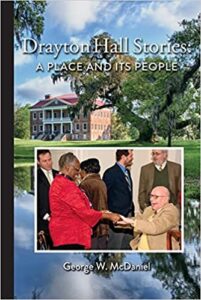DRAYTON HALL STORIES by George W. McDaniel (Togo)

George McDaniel
George W. McDaniel (Togo 1968-70) has writing a new portrayal of this 18th-century icon among America’s historic sites, Drayton Hall Stories: A Place and Its People is the first book in the nation to focus on a site’s recent history using interviews with descendants (both White and Black), board members, staff, donors, architects, historians, preservationists, tourism leaders, and more. Like different pieces of a mosaic, each interview combines with others to create an engaging picture of this one place, revealing never-before-shared family moments, major decisions in preservation and site stewardship, and pioneering efforts to transform a Southern plantation into a site for racial conciliation. Readers will come to see Drayton Hall’s people not as stereotypes, but as the real people they were — and are. Maps, photographs, lines of descent, interview questions, a how-to guide, and related website, all provide blueprints for readers who wish to undertake similar endeavors to build community in today’s world.
George W. McDaniel is executive director emeritus of Drayton Hall, a historic site owned by the National Trust for Historic Preservation and operated by the Drayton Hall Preservation Trust in Charleston, South Carolina. A native of Atlanta and a former Peace Corps Volunteer in Togo, West Africa, he holds a B.A. in history from Sewanee, a Masters of Arts in Teaching in history from Brown University, and a Ph.D. in history from Duke University. He is the author of numerous publications, his most recent being an essay, Asking Big Questions of Small Places, in Interpreting African American History and Culture at Historic Sites and History Museums (2015).
•
Drayton Hall Stories: A Place and Its People
by Georg W. McDaniel (Togo 1968-70)
Evening Post Books
April 2022
$39.95 (Hardback)

I thank the Peace Corps for posting this notice, and though I don’t shout about it, the book was influenced by my Peace Corps experience. Thanks to the Peace Corps, I met all kinds of people and developed patience and empathy as I learned about ways of life different from mine. At the same time, I gained new appreciation for our common humanity, as illustrated by the clasped hands in the candid photograph on the cover.
Though different from most books, I hope you enjoy learning about those differences, as a Peace Corps Volunteer should, and that you will come to connect with its stories. In the Peace Corps, I came to appreciate all the more the value of such stories, and that appreciation shaped the title.
I hope you enjoy the book, spread the word, and undertake such an endeavor. Using a place as a focal point, can’t we seek to bring people together to converse and share feelings and thoughts and develop empathy in these divisive times? That’s what this book seeks to do.